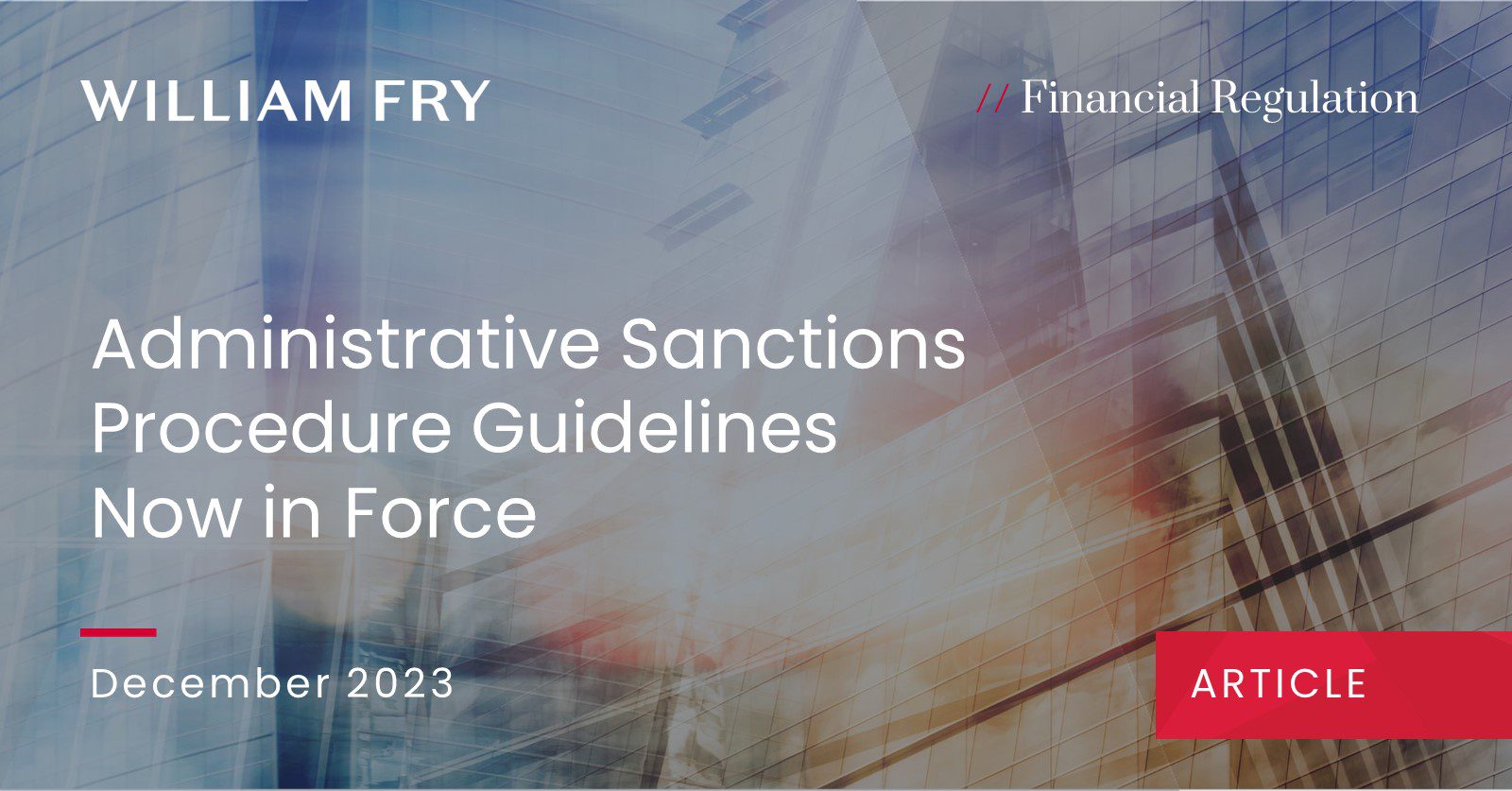On 13 December 2023, following a twelve-week public consultation, the Central Bank of Ireland (CBI) published a Feedback Statement and consolidated Guidelines (Guidelines) relating to the enhanced Administrative Sanctions Procedure (ASP).
See our earlier article examining some key enforcement reforms proposed in the draft guidelines.
The Central Bank (Individual Accountability Framework) Act 2023 (IAF Act) introduces important changes to enhance the ASP under Part IIIC of the Central Bank Act 1942 (1942 Act). The overall structure of the ASP remains largely unchanged, but certain procedural amendments to the ASP have been made strengthening the existing process and reflecting the expanded population of individuals now within the scope of the ASP under the IAF Act.
Legal Basis
The ASP is the CBI’s primary tool for carrying out investigations and inquiries and imposing administrative sanctions if it determines that firms or individuals that it supervises have breached financial services legislation.
To take account of amendments to the ASP by the IAF Act, the CBI has revised and consolidated the previous guidelines on the ASP, namely:
- Inquiry Guidelines prescribed under section 33BD of the Central Bank Act 1942 (November 2014)
- Outline of the Administrative Sanctions Procedure (2018)
- ASP Sanctions Guidance (November 2019)
The ASP involves the following steps:
- Investigation
- Issuing a Draft and Final Investigation Report
- Decision on whether to hold an Inquiry
- Inquiry
- Appeal and Court Confirmation
The CBI also has the discretion to settle any matter at any stage. Some key amendments to each step under the Guidelines are now set out.
Investigation
Where the CBI becomes aware of circumstances suggesting that a prescribed contravention has been committed by a regulated firm or individual (Subject), it may carry out an investigation. This investigation will usually be carried out by the CBI Enforcement team, and a Responsible Authorised Officer (RAO) will be appointed.
The Guidelines now include additional information on the role of the RAO, including, a statement that they are required to carry out their duties fairly and proportionately. The RAO must provide the Subject with a written Notice of Investigation (Notice), identifying the prescribed contraventions and the timeframe within which the Subject must respond. Any responses to the Notice should be in open correspondence (not marked “without prejudice”). If required, the Notice may be amended at any stage and re-issued to the Subject, meaning the investigation may be narrowed or broadened as appropriate.
The CBI will gather information and evidence throughout an investigation. It may collect documentary evidence and carry out interviews with witnesses, including the Subject. An interviewee may be accompanied by an independent legal representative for advisory purposes only.
Any person who receives an “information request” from the CBI must engage and submit timely responses. The CBI may apply to the High Court to secure compliance with the information request. It is open to the recipient of an information request to make a claim of legal professional privilege (LPP) over a portion or all of the requested information. The privilege owner and the CBI may enter into a disclosure agreement voluntarily, where the privilege owner waives LPP on a limited basis. This does not constitute a waiver of privilege in relation to third parties. The Guidelines note that in practice, a disclosure agreement will include a provision confirming that the CBI can use the disclosed material for the performance of any of its statutory functions and any other purpose specified in the agreement.
The RAO is responsible for preparing a Draft Investigation Report (Draft Report) as soon as practicable after an investigation is completed. The Draft Report is issued to the Subject, who is entitled to make written submissions within a stated period, which will be set by the RAO. The stated period will vary from case to case but will not be less than seven days.
Following the consideration of any submissions made, the RAO will make necessary revisions to the Draft Report before finalising it (Final Investigation Report). The Final Investigation Report is furnished to the appointed CBI decision-maker, to decide whether to hold an inquiry. The RAO will not express any opinion on or make any recommendation in the Final Investigation Report on sanctions if a finding is made that the Subject committed a prescribed contravention. The RAO will also provide the Subject with the Final Report in electronic form.
Any person who receives a copy of a Final Investigation Report is obliged not to disclose the existence of or content of that report unless authorised to do so by the CBI in writing or required to do so by law.
Inquiries
Following an investigation, if the CBI reasonably suspects the commission of a prescribed contravention, it may hold a public inquiry. The default position is that all hearings are held in public unless an exception applies. Inquiry members appointed by the CBI from the Regulatory Decisions Panel will have the power to conduct an inquiry to determine if a Subject committed a prescribed contravention. The Guidelines provide for the management of conflicts of interest in respect of CBI inquiry members.
The Subject must be notified in writing of the decision to hold an inquiry and be advised of the next steps. A notice will also be placed on the CBI website confirming that an inquiry has commenced.
An inquiry management questionnaire (Inquiry Questionnaire), intended to narrow the matters, will issue within six weeks from the date on which an inquiry commences. The Guidelines describe the process around the Inquiry Questionnaire, including the need for an inquiry management meeting, sharing of responses electronically with all inquiry participants, and that a stenographer will attend all hearings and a copy of the transcript will be made available to all inquiry members and participants.
When the inquiry concludes, the inquiry members will prepare the written inquiry finding (Inquiry Finding). The Inquiry Finding must set out in writing whether a prescribed contravention has been or is being committed, the grounds upon which the finding is based, and any sanctions imposed.
Before determining the sanction, the inquiry members will invite the CBI enforcement team to make submissions. The Subject will then be invited to make replying submissions. The enforcement team will have a right to a final reply.
Once the inquiry members have determined the sanctions, they will prepare the inquiry decision (Inquiry Decision). This will set out the sanction to be imposed and the grounds for its imposition. The Inquiry Decision may be appealed to the Irish Financial Services Appeals Tribunal (IFSAT).
Once the Subject has been notified of the Inquiry Decision, the CBI website will be updated to reflect the conclusion of the inquiry. If there is a finding of a prescribed contravention, after the Inquiry Decision has been provided to the various inquiry participants, an inquiry publication notice (Publication Notice) will follow. This sets out details of the finding, including the sanction imposed, the prescribed contravention and the name of the firm or individuals to whom the finding or sanction relates. Although an Inquiry Decision only takes effect when the High Court confirms it, the Publication Notice can be issued before such confirmation. The Guidelines provide that a draft of the Publication Notice will be shared with the Subject for their submissions. When published, the Publication Notice will state that it is subject to confirmation and will be updated with the outcome of the confirmation or appeal procedure.
Settlement
At its sole discretion, the CBI may resolve an ASP matter by way of settlement. There are three separate settlement processes:
- Undisputed Facts Settlement;
- Investigation Report Settlement; and
- No Admissions Settlement.
The Subject can indicate a “willingness to enter” the Undisputed Facts Settlement process. The Guidelines clarify that the CBI may issue a without prejudice Settlement Procedure Letter offering the possibility of settlement under the Undisputed Facts Settlement. If a willingness to engage is indicated, the CBI may provide a letter setting out the proposed terms of settlement on a without prejudice basis.
An Investigation Report Settlement can only occur after a Final Investigation Report is considered and deemed appropriate for settlement. It is available in the inquiry process until an Inquiry Decision is made.
The Guidelines set out a non-exhaustive list of factors to which the CBI may have regard, and which indicate whether an ASP matter is suitable for the No Admissions Settlement. The greater the degree to which such factors exist, the greater the likelihood that a No Admissions Settlement is inappropriate. Factors include harm to customers, risk to the market, the public interest, and deterrent effect. It is also available at any time before an Inquiry Decision being made.
Once the settlement process concludes, the CBI and the Subject will enter into a binding settlement agreement. The settlement agreement represents the final agreed position between the parties and, where a monetary penalty has been agreed, it will contain details as to how such penalty is to be paid. Where a discount has been applied to a monetary penalty, a statement to this effect will be included in the settlement agreement. There is no requirement for discounts to be offered, but if it is, the level of discount is informed by certain matters including the effective use of CBI time and resources and the public interest.
A settlement agreement will form part of a Subject’s compliance record. Settlement agreements may be considered cumulatively by the CBI and may be indicative of a Subject’s compliance culture. A settlement agreement entered with an individual may be considered by the CBI in assessing that individual’s fitness and probity to perform a controlled function, including a pre-approval-controlled function. Previous settlement agreements may be considered in determining appropriate sanctions in other enforcement actions involving the Subject.
The Guidelines provide that where a settlement process has concluded, a public statement will be issued. A Subject will have the opportunity to engage on the public statement before the conclusion of the settlement.
Sanctions
The CBI may impose sanctions on firms and individuals by way of settlement or following an inquiry. The Guidelines set out the CBI’s approach in determining sanctions. Considerations include the CBI’s overall mission to serve the public interest by safeguarding monetary and financial stability, and to ensure the financial system operates in the best interests of consumers, investors and the wider economy. The CBI also considers overarching general principles of proportionality, deterrence, and totality.
The availability of a particular sanction depends on different factors, including whether the Subject is a firm or an individual. The range of sanctions available to the CBI includes caution, reprimand, monetary penalties, refund of funds, suspension or revocation of authorisation or disqualification from performing a controlled function.
Regarding monetary penalties for individuals, the CBI’s starting point in calculating the monetary penalty will usually be relevant income. For firms, the starting point is their revenue. Typically, therefore, higher-earning firms will be subject to higher penalties (subject to the maximum penalties set out in the 1942 Act). If an alternative starting point is appropriate, the CBI will explain that to the Subject. The Guidelines clarify that Subjects will be provided with information on how the monetary penalty is calculated.
Where the sanction comprises conditions or disqualification, the Guidelines clarify that the CBI will determine this on a case-by-case basis, dependent on the facts and the circumstances of the individual. Examples of potential conditions set out in the Guidelines include that the individual is supervised in performing a controlled function, or that the individual obtains a qualification or training to address any deficit in skills or experience.
High Court Confirmation and Appeal
- Where the CBI has concluded a settlement with a Subject under the Undisputed Facts Settlement Process or the Investigation Report Settlement Process, any sanction imposed will not take effect until the High Court confirms the sanction.
- An Inquiry Decision will not take effect until the High Court confirms it.
- Where an Inquiry Decision has been appealed to IFSAT, and IFSAT has determined that appeal (and has not set it aside), the CBI will apply to the High Court for confirmation of IFSAT’s decision.
Conclusion
The ASP is prescribed in legislation. The Guidelines guide the operation of the ASP and set out the CBI’s approach to investigations, inquiries and administrative sanctions. In the event of a conflict between the legislative provisions and the Guidelines, the legislation prevails. It is open to the CBI to depart from the Guidelines in appropriate circumstances, and if so, the CBI will notify the Subject of any departure.
The Guidelines apply to investigations and inquiries commenced after 19 April 2023.
For more information, please contact Shane Kelleher, Hilary Rogers, Joanne Ryan or any member of the IAF/SEAR team or your usual William Fry contact.
Contributed by Eilís Quinlivan




